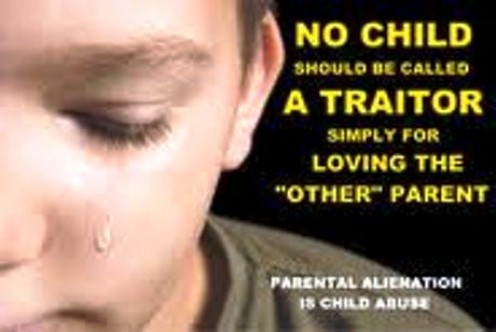Parental Alienation Syndrome & Family Law
What is Parental Alienation Syndrome?
"Parental alienation is often raised as a reason for children not wanting to see the parent who they do not live with in child contact and residence disputes. The psychological process of parental alienation is said to develop by the parent with care, and therefore with power, directly or indirectly causing the child to show unjustifiable anxiety, disrespect or hostility towards the non-resident parent. The result of the processes is that the child ultimately rejects the non-resident parent, and typically asserts that they are doing this of their own volition. The process is problematic because, in child contact and residence disputes in the United Kingdom, the family courts place the wishes and feelings of the child at the centre of their decision-making. Therefore, when a child says that it does not want to see the non-resident parent, this assertion is likely to be given considerable weight by the courts; unless it can be demonstrated that the child is a victim of parental alienation."
The UK courts often prefer to use the term implacable hostility to describe the symptoms shown by the parent with care when a child has been subject to parental alienation. Some psychologists and psychiatrists use the term pathogenic parenting to describe parental alienation by the parent with care.
It is important to note that the process of parental alienation is hugely damaging to the psychological well-being of the child that has been alienated. A good childcare lawyer will, therefore, direct the expert to consider whether the child has suffered significant harm. If a child has suffered significant emotional (psychological) harm within the meaning of the Children Act 1989, as a result of parental alienation, this can be a strong argument to reverse the current residence or child contact arrangements in favour of the parent that does not have residence or has limited contact with the alienated child. Put another way, many expert psychologists and child care mental health professionals believe that parental alienation is child abuse.
Our expert psychologists have worked with children and young people in several settings and provided advice for parents in child contact disputes.
Why Has it Been So Difficult for a Diagnosis of Parental Alienation to be Accepted in UK Courts?
Our expert psychologists are particularly familiar with the work by Richard Gardner on parental alienation syndrome, a concept that has been recognised by some in the USA but has not generally found acceptance by the family courts in the UK. The concept is controversial. Parental alienation syndrome has not received general acceptance by the courts for two key reasons:
- an alienation syndrome is not a professionally recognised diagnosis; and
- the absence of a reliable clinical-forensic assessment of the alienation syndrome.
"Consequently, parental alienation did not exist as a discrete category in the Diagnostic and Statistical Manual of Mental Disorders in the American Psychological Association DSM-IV (which is now obsolete). However, this does not mean that such a process does not exist. Our expert psychologists have observed the process in several family settings."
This explains why the assessment of parental alienation does not form part of the formal training of psychologists or psychiatrists. Formal training in the area is, therefore, by self-directed learning and practical experience of dealing with such cases.

How is Parental Alienation Diagnosed?
Dr Craig Childress, one of the leaders in this field, teaches that parental alienation is a two-person diagnosis. Childress believed it is necessitated by the child’s primary diagnosis of a shared psychotic disorder (DSM-IV TR Code 297.3) when the child effectively shares the delusional belief system of the alienating parent.
Central to this model is the view that the alienating parent has a personality disorder with borderline, narcissistic and antisocial features. Emerging from the personality disorder of the alienating parent is an “encapsulated” delusional disorder (a fixed belief system that is impervious to facts, reason or evidence) involving the inadequacy of the targeted parent (often the parent without care). The fixed belief system represents an intransigent psychological re-enactment dynamic of early childhood relationship trauma consistent with the development of personality disorder.
In when the DSM-5 was developed, Dr Childress refined his model it fits with the following DSM-5 diagnosis:
- 309.4 Adjustment disorder with mixed disturbance and emotions and conduct
- V61.20 Parent-Child Relational Problem
- V61.29 Child Affected by Parental Relationship Distress
- V995.51 Child Psychological Abuse, Confirmed (pathogenic parenting)
Richard Gardener believed that parental alienation syndrome appears mainly in child custody dispute where the child turns massively against the parent without care without reasonable grounds for doing so. This action of the child is a result of the parent with care’s emotionally abusive attempts to incite the child against the non-custodial parent. Gardener believed that where a child’s rejection of the parent is based on some real experience, a diagnosis of parental alienation should not be made.
Find Out More About Parental Alienation
Expert Witness Psychologists
Expert Witness Psychologists
What is Psychology?
Psychology is the science of mental life. The discipline is of relevance to professionals working in various areas of the legal profession.

How Expert Witness Psychologists Assist in Criminal Proceedings
Expert Witness Psychologists are often called on by criminal law experts to advise on whether an individual needs an intermediary to participate fairly in the proceedings as either a defendant or a witness for the prosecution. Psychologists often indicate whether an individual needs further evaluation to determine whether they are fit to plead. Additionally, psychologists may be able to advise the court whether an individual was culpable of an offence that they have been charged with because of an underlying psychological condition.
Psychologist expert witnesses are often called to give evidence in parole hearings, and advise parole boards whether a prisoner is suitable for parole.
How Expert Witness Psychologists Assist in Employment Tribunal Proceedings
Psychologist expert witnesses also assist in employment tribunal proceedings. They are often called on to advise on whether an assessment selection process or redundancy process was discriminatory. They also advise Employment Tribunal is on whether or not the claimant before the tribunal had a disability within the meaning of the Equality Act 2010. Individuals in the workplace often suffer from a wide range of disabilities including, depression, anxiety, dyslexia, and ADHD. These disabilities are often hidden but in certain situations can adversely affect individuals gaining employment and staying in a job.
How Expert Witness Psychologists Assist in Personal Injury Proceedings
In personal injury proceedings, expert witness psychologists are often called on to assess the cause of psychological trauma, determine how long it will take the claimant to recover. Expert psychologists working in this area frequently carry out neuropsychological assessments of brain injury. In all areas where psychological is carried out expert psychologists will often see to validate the findings by using a range of psychological techniques to detect malingering, and symptom exaggeration.
How Expert Witnesses Psychologists Help In Care Proceedings and in The Family Court
Psychologist expert witnesses are often called upon by social services departments and families in private and public law care proceedings. They carry out assessments of fitness to parent, whether the child subject to the proceedings has been harmed or is likely to be harmed by the parents or the likely disputes that have taken place between the parents. They are frequently asked by both social services departments, fathers and mothers to determine the level of attachment and to advise whether the child has suffered parental alienation (pathogenic parenting).
In family law cases, expert psychologists often carry out risk assessments to determine whether the child would be at risk if there was unsupervised contact unsupervised contact
How Expert Witness Psychologists Assist In Housing Law and Possession Proceedings
Individuals who are subject to possession proceedings, frequently lack the capacity to make a proper defence and conduct their own affairs including issues that might put them at risk of being evicted. Such action can be discriminatory under the Equality Act 2010. Expert psychologists can often advise in these cases, for example where depression or conditions such as hoarding disorder impacts on the ability of the tenant to manage their property.
How Expert Witness Psychologists Help In Education Law
In education cases, expert witness psychologists often assist parents by carrying out assessments to ensure the relevant child has an appropriate Educational and Health Care Plan. Additionally, Expert witness psychologists appear in Educational Needs and Disability Tribunal’s, and also provide evidence in judicial review proceedings when parents challenged the educational provision offered to the child.
